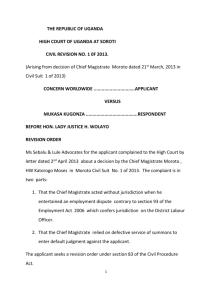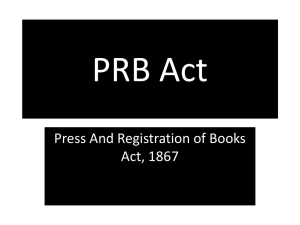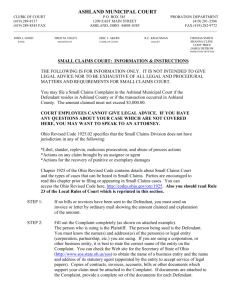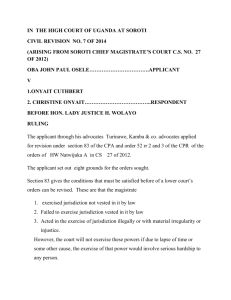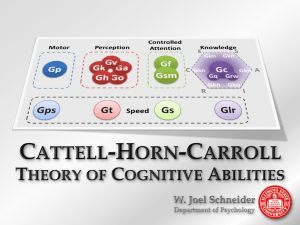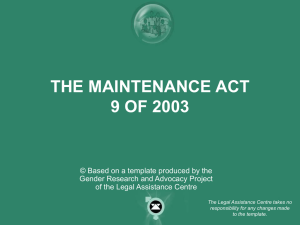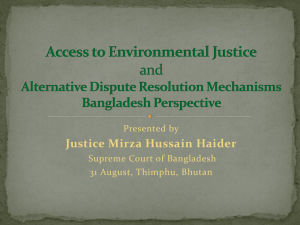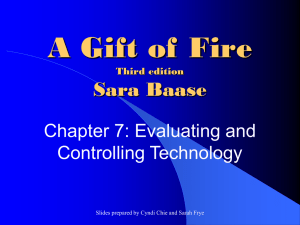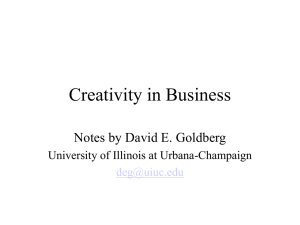HH GINA MENSAH
advertisement
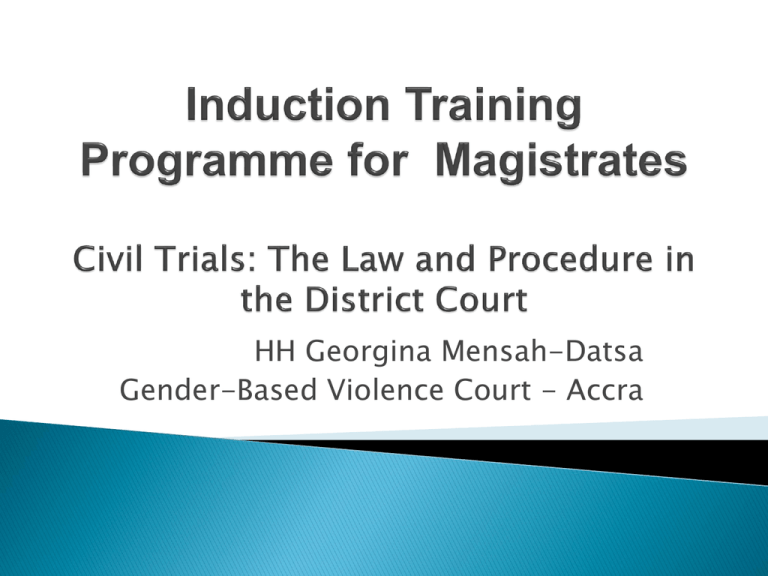
HH Georgina Mensah-Datsa Gender-Based Violence Court - Accra Jurisdiction is conferred by law The civil jurisdiction of District Courts is provided in Sections 47 of the Courts Act 1993 (Act 459) as amended by Act 620. The civil jurisdiction includes all personal actions arising under contract or tort for the recovery of any liquidated sum where the amount claimed does not exceed ¢50 million (GH¢5000) in matters relating to landlord and tenants of any premises, actions relating to ownership, possession or occupation of land where the value of the land does not exceed ¢50 million (GH¢ 5000). Monetary - GH¢ 5000. (¢50 million) Geographical area/ Place LI 1574 Area of the District Court is limited to the District in which it is situated. Section 51(4) of Act 459 provides that no act done shall be void merely because it originated from a District not within jurisdiction. Subject Matter Law e.g. Limitation Act Section 47(3) of Courts Act - where in any action, cause or matter the amount claimed or the value of any land or property exceeds the amount or value specified in subsection (1), the District Court shall notwithstanding that sub section, proceed to hear the case if the parties agree that it should do so. Section 51(a) of Courts Act objection raised to jurisdiction of the court should be before Plaintiff calls his first witness Section 6 of Rent Act 1963 (Act 220) Magistrate should not just enforce the decree referred to him as it is only a recommendation. Magistrate has a duty to investigate it. Do not adopt the order as evidence. One has to be satisfied that Section 17 of Act 220 on recovery of possession and ejectment has been applied The District Court has a special division where it serves as a Family Tribunal to hear and determine actions that arise under the Children’s Act of 1998 (Act 560). Act 560 gives the Family Tribunal the legal mandate to adjudicate matters of parentage, custody, access and maintenance of children. The Family Tribunal also has jurisdiction in cases concerning children in need of special care and protection, and deciding on care and supervision orders. By Section 65 of Act 560 the court can deal with an application for adoption. Section 37 of Act 560 provides that the proceedings at a Family Tribunal shall be as informal as possible and shall be by enquiry and not by adversarial procedure. Magistrates should take advantage of the summary nature of trials to be Proactive. This power is provided by Order 29 of the District Court Rules, 2009, C.I 59. Circumstances for Review Read Order 29 of C.I 59 in conjunction with Ord. 42 of High Court Rules (C.I 47) New and Important matter, A matter of evidence, Applicant must show that information came to him after the trial after due diligence. Mistake of fact apparent on face of record. No need to take further evidence e.g. where the Magistrate records the Plaintiffs evidence as that of Defendant. Ekuban v. Ekuban (1965) GLR 599 Error of Law. Where there is misapplication or misapprehension of Law – refuse review, the case should go on Appeal. Ampofo v. BrongAhafo case Where a Magistrate gives judgment on Monday and on Tuesday the Supreme Court overrules cases used by the Magistrate for decision on Monday, the Magistrate has to review after judgment. Order 69 rule 2(1) application for review must be made not later than 14 days Where all parties were not present then the 14 days will be counted from date party is aware of the judgment. The court should not review the case without the parties. The parties should be present. The court does not have power on its own to Review a case. Cases: Nortey & ano v. Damatey (1974) 1 GLR 31 Micah v. Bruce (1971) 1 GLR 153 Darbah v. Ampah (1989-90) 2 GLR 103 Ampofo v. Brong-Ahafo Corp. (1961) GLR 62 In the last case above where the court is mislead, court has power to review and court exercised its power of review. Sometimes application for Review is a guise to try the case, do not review see case 3 above. The court has no say with respect to Consent Judgment. The court has to record the terms of settlement as a Judgment. A Magistrate has no power to review this. Previously Review must be made by the same panel/ Magistrate/ Judge now does not have to be. Order 42 r.4 of C.I 47 Executions – Order 21 Writ of fieri facias Writ of delivery Writ of possession Garnishee proceedings. A charging order The appointment of a receiver Procedure for commencement of civil action Procedure is informal. It starts with a Writ of summons Order 2 r. 3(5). Writ should conform to Order 2 r.3 of C.I. 59. Judgment should not exceed claim- Order 3 r. 2(1). Undefended Suits- Order 8 – Specially endorsed writ for debt or liquidated amount. Money claim or for liquidated amount and supported by an Affidavit stating that the defendant has no defence. The proceeding established by that order is a peculiar proceeding, intended only to apply to cases where there can be no reasonable doubt that a plaintiff is entitled to judgment, and, where therefore it is inexpedient to allow a defendant to defend for mere purposes of delay. Fofie v. Pomaa and others (1974) 2 GLR 6, Liquidated amount is a specific amount or ascertainable amount. There is no need to lead evidence to establish the claim. Adunna and others v. Mfum (1971) 1 GLR 89, debt or liquidated demand – mere mention of figure is not enough – if evidence has to be lead it is not a liquidated demand Where case is placed on undefended suit the defendant has 5 days within which to Swear an Affidavit stating that he has a good defence . Then the defendant should be permitted to defend the action. The case is then placed on the General List. General List the return date is 5 days excluding weekends and public holidays. Bramsco Food Marketing and Supply co. v. Mohamadu (1973) 2 GLR 4. Statement by parties as basis of their claim. Pleadings are not mandatory. They are made on an Order of the court in complex cases to clarify the case or narrow down the issues. Pleadings show the areas of agreement where no evidence is needed and areas of conflict where evidence has to be led. Note sometimes pleadings are used to delay the hearing of the case. Issues are the areas of disagreement. At the District Court there is no Application for Directions. It is the Magistrate who sets down the issues. General List- Where the defendant does not appear, hear the plaintiff and decide the case. Undefended Suits - Order 8 When the defendant has been served but does not appear within the Return date, give Summary Judgment for the plaintiff. In Kuma v. Ankuma (1972) 2 GLR an application to set aside judgment on the sole ground that judgment was outside the geographical jurisdiction was refused Venue of Proceedings- Order 5 r. 1 Transfer- Order 5 r. 2 Costs – Order 7 Cost in cause of trial. Cost at the end/ after judgment. Costs are awarded to the successful party. Amount should reflect the efforts made in the case. Where no costs are awarded give reasons e.g. family members. Matrimonial Applications- Order 32 District Court can deal with: Divorce Paternity Custody of children and Other matrimonial causes Locus in quo – the essential condition is that there is a material issue which could not be resolved otherwise than by visual inspection. Interlocutory matters – Order 13, any matter occurring in the course of proceedings in which a magistrate is called upon to make a ruling which does not determine the matter. An interlocutory proceeding is taken during the course of an action and incidental to the principal object of the action. It consists of all steps taken in assisting either party before judgment. Examples include amendment, joinder, injunctions, absconding warrant, THANK YOU
